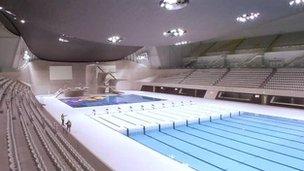The legacy of the Olympics for NI
- Published

Bangor's new £38m Olympic pool, the first 50m facility in Northern Ireland
It is half past five in the morning and about 30 teenagers are starting a two-hour training session at Bangor pool.
It takes a huge commitment from the youngsters, their coaches and parents, who watch intently from the pool side.
Elite swimmers in Great Britain and the Republic are training in top notch 50m pools, like Dublin's National Aquatic Centre.
Fourteen-year-old Shannon McKimm explains how the Bangor youngsters get a taste of the big time when they head south for competitions.
"When you go down to the Irish events, they will have a 10-lane 50m pool which is the Olympic standard," she said.
"They have medical centres, they have drug testing rooms, they have basically what you would be looking for Team GB to have - and they get that 24 hours a day."
When Shannon finishes her morning training, she heads off to school, at nearby Glenlola Collegiate.
From her classroom windows, rising above the trees, she can see Bangor's new £38m Olympic pool, the first 50m facility in Northern Ireland.
It is being developed by North Down Borough Council, with the help of about £15m of funding from the Department of Culture, Arts and Leisure (DCAL).
It was due to open two years ago, but because of difficulties in drawing down government funding, that had to be delayed until this summer.
However, an avoidable problem in the building work, when the roof beams were damaged in transport from Austria, has pushed that date back even further and the pool will not open until next February.
Sports Minister Caral Ni Chuilin is due to visit the site this week to take part in a naming ceremony.
'Holding to account'
It is being branded the "Aurora", the Latin word for "dawn".
"That pool has had to go through a lot of challenges both seen and unforeseen," said Ms Ni Chuilin.
"They're working flat out and I'm told they're on target. I am keeping a very close eye on it, and if I find out anything different, I'll be holding them to account."
The Aurora is the largest sports project currently under construction in Northern Ireland, employing 200 workers on site.
And it is the only piece of infrastructure that can be described as an Olympic legacy.
Until last year, it was hoped that there would be at least five elite sports centres built around the time of the 2012 Games.
Plans were at an advanced stage for the projects, including a sailing academy at Ballyholme in Bangor and a velodrome in Downpatrick.
But the executive decided to fund only the Bangor pool, leaving the other sporting organisations frustrated that their plans - which had involved considerable time and money - were being shelved.
Instead, about £138m was allocated for the upgrade of stadia for the three major sports - football at Windsor Park, rugby at Ravenhill and GAA at Casement Park.
Economist Philip McDonagh said financial realities in these recessionary times put paid to more ambitious plans to boost the so-called "minor" sports.
"It is disappointing that there won't be more facilities, but the problem is that we would have had to build and pay for them ourselves out of a shrinking Northern Ireland budget. So it would have been nice, but it was going to be at a cost and I'm not sure the cost benefit really justified that investment," he said.
So, apart from the new 50 metre pool in Bangor, is Northern Ireland gaining anything from the Olympics?
There were hopes of an economic boost for local companies who have been tendering for work on the Olympic venues in London. But there has been limited success in this endeavour.
Stepping stone
The latest available figures from the Olympic Delivery Authority (ODA) show that by last July it had awarded 1,500 contracts, worth around £5bn.
Most of the successful firms were in the south-east of England.
Here in Northern Ireland, just 43 companies have so far won contracts totalling £40m. That is less than 1% of the total awarded.
One of the few local firms to secure work at the Olympic village is H & J Martin from Belfast.
The company has won about £7m worth of business, including the fit out of the media centre.
Division director Geraldine Gordon said the company had many hurdles to jump in the tendering process.

Sports Minister Caral Ni Chuilin said she was disappointed more local companies had not won contracts
"We wanted to grow the business in London generally," she said.
"For us it was seen as the key stepping stone in raising the profile of the company. It took about a year and a half before we had our first success."
The sports minister said she was disappointed that more local companies had not managed to secure contracts from the ODA.
"We didn't succeed as much as we would have liked to have done," said Ms Ni Chuilin.
"I was talking to people in Scotland and from the north of England and they are all saying the same thing.
"Why shouldn't we ask why what lessons do we need to learn? We need to know what to do to make the next time better."
Mr McDonagh supports the minister's view that Northern Ireland will benefit from a long-term Olympic legacy in terms of greater participation in sport - and that can only be good for us.
"One of the demonstrated effects of the Olympics games is that it gets people to participate in sport. I think over the next few years we will see more people getting involved, and already Sport NI is putting money into trying to encourage people to participate in sport," he said.
"And that's not just a social benefit, it's worthwhile financially and economically as it reduces the burden on our health and social services of looking after people."
Enthusiasm for sport should also be boosted by the presence of at least eight Olympic and Paralympic teams who are coming here for pre-games training camps.
The athletics teams from Qatar, Egypt, Kuwait and Sudan and the Jordanian Paralympic team will train at Antrim Forum during July and August.
The Chinese gymnasts will be Lisburn and the Australian boxers will be based in Belfast. It is hoped that the Cuban boxers will also sign up for a training camp.
You can see more on this story on the Sunday Politics at 22.05 GMT on BBC One.